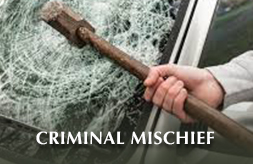
KNOWINGLY LEAVING THE SCENE OF A MOTOR VEHICLE ACCIDENT
RESULTING IN “SERIOUS BODILY INJURY”—N.J.S.A. 2C:12-1.1
Leaving the scene NJ
If you’ve been charged with violation of 2C;12-1.1, (leaving the scene NJ) if convicted, you have exposure to a possible range of jail time from a minimum of 1 year (4th degree) to a maximum of 10 years (2nd degree), fines of up to $10,000.00 (4th degree) to a max of $150,000.00 (2nd degree), and a criminal record and loss of driver’s license. I have been practicing criminal law for 26 years. Please contact me at (732)-337-7922 for an evaluation of your circumstances and vigorous and competent representation.
ILLUSTRATIVE EXAMPLE OF CONDUCT CONSTITUTING THE OFFENSE:
You are tooling down a rural road one night in your Ford 350 Super Duty pick up truck. You’ve polished off a six pack at happy hour and now you’re just trying to get home. The jerk in the vw beetle in front of you is crawling at 20 m.p.h.. You pass him so fast and hard you push him off the road and right into a tree. You recognized that as you passed you felt a slight bump, but you are afraid to call the police because you might get another DWI and besides, you didn’t really feel that a real collision occurred. So, you just keep on going. Unfortunately, the driver of the vw beetle suffered a subdural hematoma with cognitive brain injury, shattered L5-S1 cervical disk and and a torn meniscus horn. The next morning the police show up at your door with a Complaint. Have you just committed a serious criminal offense?
THE ACTUAL LAW—N.J.S.A. 2C:12-1.1
“A motor vehicle operator who knows he is involved in an accident and knowingly leaves the scene of that accident under circumstances that violate the provisions of R.S.39:4-129 shall be guilty of a crime of the fourth degree if the accident results in serious bodily injury to another person. The presumption of nonimprisonment set forth in N.J.S.A. 2C:44-1 shall not apply to persons convicted under the provisions of this section.
If the evidence so warrants, nothing in this section shall be deemed to preclude an indictment and conviction for aggravated assault or assault by auto under the provisions of N.J.S.A. 2C:12-1.
Notwithstanding the provisions of N.J.S.A. 2C:1-8, or any other provision of law, a conviction arising under this section shall not merge with a conviction for aggravated assault or assault by auto under the provisions of N.J.S.A. 2C:12-1 and a separate sentence shall be imposed upon each conviction.
Notwithstanding the provisions of N.J.S.A. 2C:44-5 or any other provisions of law, whenever in the case of such multiple convictions the court imposes multiple sentences of imprisonment for ore than one offense, those sentences shall run consecutively.
For the purposes of this section, neither knowledge of the serious bodily injury nor knowledge of the violation are elements of the offense and it shall not be a defense that the driver of the motor vehicle was unaware of the serious bodily injury or provisions of R.S.39:4-129.”
The answer to the question is YES. You caused a collision resulting in serious bodily injury to the victim, subsequently left the scene without even attempting to assess the injuries or secure help. “Serious bodily injury” is defined in this context as “…bodily injury which creates a substantial risk of death or which causes serious permanent disfigurement, a protracted loss or impairment of the function of any bodily member or organ.” N.J.S.A.2C:11-1(b). And you have arguably met that threshold under the fact pattern.
This statute must be seen as a version of the “leaving the scene of an accident” under N.J.S.A. 39:4-129 (not a criminal offense) on steroids, e.g., catapulting a leaving the scene up to a felony if the collision causes “serious bodily injury”.
Another striking aspect of this statute is the exceptions it makes to N.J.S.A. 2C:43-3, et seq., the 2C Sentencing Guidelines, to render nugatory the usual presumption of non-incarceration for fourth degree crimes and to allow additional separate convictions for assault and assault by auto. Also, by requiring that multiple sentences run consecutively (as opposed to concurrently) a defendant convicted under this statute is likely to have to pay monetary fines of up to $10,000.00 for a fourth degree crime, up to $15,000.00 for a third degree crime and up to $150,000.00 for a second degree crime. In addition, jail time for a fourth degree crime is a minimum of one (1) year and a maximum of eighteen (18) months, and for a third degree crime, a minimum of three (3) years and a maximum of five (5) years, and for a second degree crime, a minimum of five (5) years and a maximum of ten (10) years. N.J.S.A. 2C:43-3(a) and (b) Obviously, if charged with multiple offense in which, if convicted, the sentences must run consecutively (separately) it incrfeases the likelihood that you must serve a protracted jail term, depending upon the injuries inflicted on the victim.
If you’ve been charged with this offense you need to retain a skilled and experienced attorney to protect your interests immediately. Contact me for help at 732-337-7922




